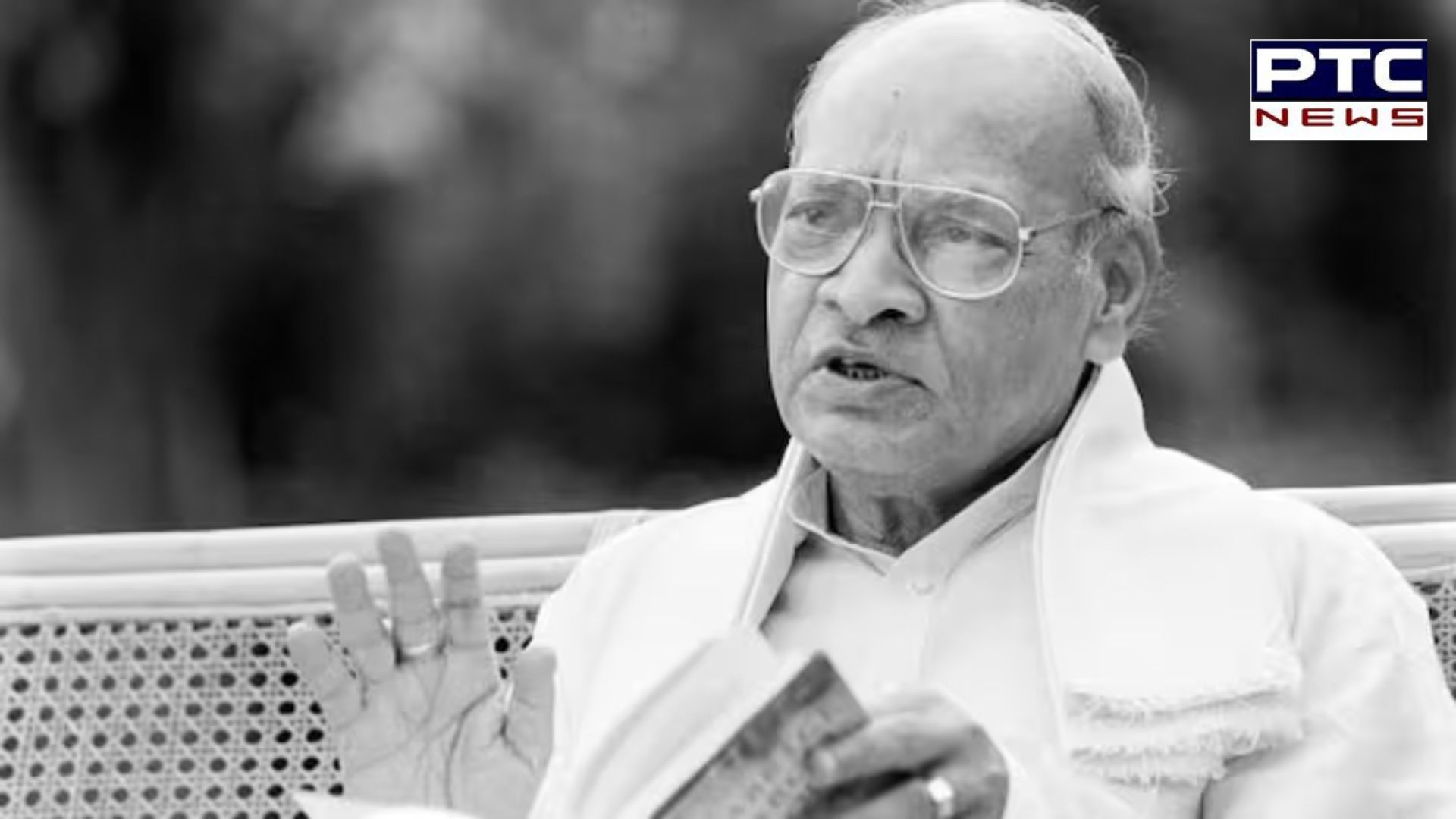Who is PV Narasimha Rao? The first Congress Prime Minister beyond the Nehru-Gandhi dynasty

PTC News Desk: PV Narasimha Rao, the former Prime Minister of India, has recently been posthumously honoured with the Bharat Ratna, the nation's highest civilian award. Renowned for his pivotal role in steering India through transformative economic reforms in 1991, Rao's legacy extends far beyond his tenure in office.
Born on June 28, 1921, in a humble agrarian family in Telangana, Rao's political journey was marked by resilience and intellectual prowess. His ascent to the highest echelons of power within the Congress party, despite hailing from outside the Nehru-Gandhi dynasty, was a testament to his political acumen and leadership skills.
Rao's tenure as Prime Minister, from 1991 to 1996, is widely regarded as a watershed moment in India's economic history. Faced with a looming economic crisis exacerbated by years of stifling bureaucratic regulations under the license raj, Rao, along with his then-Finance Minister Dr. Manmohan Singh, initiated bold and unprecedented economic liberalisation measures. These reforms dismantled barriers to foreign investment, deregulated industries, and paved the way for a more competitive and dynamic economy.
The impact of Rao's economic policies was profound, propelling India onto a path of rapid economic growth and modernisation. His visionary leadership not only revitalised India's stagnant economy but also positioned the nation as a global player on the world stage. However, Rao's contributions extend beyond economic reforms. His tenure witnessed significant strides in India's foreign policy, with a renewed focus on engagement with the international community. Rao's pragmatic approach to diplomacy and strategic alliances helped elevate India's stature in global affairs.
/ptc-news/media/media_files/qbuKDIQfOXflUi1LEIxP.jpg)
Moreover, Rao's commitment to education and language preservation underscores his dedication to preserving India's cultural and intellectual heritage. His initiatives in these domains laid the groundwork for a more inclusive and diverse educational landscape, fostering a sense of national identity and pride.
Despite his immense contributions to the nation, Rao's legacy has often been overshadowed by political controversies and intra-party conflicts. Nevertheless, his posthumous recognition with the Bharat Ratna serves as a timely acknowledgment of his indelible imprint on India's history and development. In conclusion, PV Narasimha Rao's legacy transcends political affiliations and dynastic ties. His visionary leadership, coupled with his unwavering commitment to India's progress, cements his place as one of the most consequential leaders in independent India's history.
Who was PV Narasimha Rao?
Pamulaparthi Venkata Narasimha Rao, born on June 28, 1921, and passing away on December 23, 2004, was a distinguished figure in Indian politics. Hailing from a Telugu Niyogi Brahmin family in Laknepalli village, Narsampet mandal, Warangal (now in Telangana), Rao's journey in public service was marked by remarkable achievements and contributions.
Rao's political career began after India's independence, where he quickly rose through the ranks, becoming a prominent Congress leader in undivided Andhra Pradesh. In a historic milestone, he ascended to the highest office in the nation, serving as the 9th Prime Minister of India from 1991 to 1996.
/ptc-news/media/media_files/C8AcxAvcOqbaOvSm6bEa.webp)
During his tenure, Rao faced formidable challenges, particularly India's severe foreign reserves crisis in 1991. In response, his government introduced sweeping economic reforms, including globalisation, liberalisation, and privatisation, which laid the foundation for India's economic transformation and emergence as a global player.
Notably, Rao's leadership marked a departure from tradition, as he became the first Prime Minister from South India and the first Congress PM outside the Nehru-Gandhi family lineage. His tenure was characterized by bold and innovative decisions, including the appointment of renowned economist Dr. Manmohan Singh as Finance Minister, signaling a commitment to expertise-driven governance and economic reform.
Also Read: Pakistan Elections 2024: 12 killed in 51 terrorist attacks as Pakistan votes
Also Read: Nanded Sikh Gurdwara Act amendment row; SGPC, Akali leaders protest against Maharashtra govt
Rao's early years were marked by his involvement in the freedom struggle, where he participated in Hyderabad's Vande Mataram movement during the late 1930s. Post-independence, he dedicated himself to public service, serving as a Member of the Legislative Assembly (MLA) from 1957 and assuming various ministerial positions in the state government, eventually becoming the Chief Minister of Andhra Pradesh in 1971. Throughout his political career, Rao remained a steadfast supporter of the Congress party and its leaders. He played a crucial role in supporting Indira Gandhi during the party's vertical split in 1969, demonstrating his loyalty and commitment to the party's ideals.
Rao's contributions extended beyond his tenure as Prime Minister. He served as a Member of Parliament, handling critical portfolios such as Home, Defence, and Foreign Affairs at the central level, and continued to play an active role in shaping India's political landscape. In conclusion, PV Narasimha Rao's legacy remains etched in the annals of Indian history as a visionary leader, a reformer, and a stalwart of Indian politics. His pioneering efforts in economic reform and governance continue to inspire generations and shape India's trajectory towards prosperity and progress.
Accusations by BJP regarding Congress treatment of Narasimha Rao
The BJP has accused the Congress of disrespecting Narasimha Rao both during his lifetime and posthumously. In 2022, Prime Minister Modi stated that the Congress failed to recognise the contributions of its own leader and former Prime Minister, P. V. Narasimha Rao, to the nation.
Also Read: Uttarakhand madrasa demolition: 4 dead, 250 injured in riots ; schools shut, internet services down
Also Read: Centre announces Bharat Ratna for former PMs Narashima Rao , Charan Singh and MS Swaminathan
(Inputs from agencies)
